Handyman Stan is a start-up offering handyman services in Duluth, Minnesota. By establishing a reputation as a qualified, affordable, and reliable provider, Handyman Stan aims to quickly gain market share and build a loyal customer base.
Handyman Stan’s target market consists of homeowners and property managers. The homeowner segment has 24,090 potential customers with an annual growth rate of 5%. The property manager segment has 1,243 potential customers and a 4% annual growth rate.
As a handyman, Stan offers a wide range of home repair services. These services typically involve minor tasks, but if a problem becomes major, it is best to consult a contractor. However, if Stan is unable to perform a repair, he provides the value-added feature of pre-screening a reliable contractor. This builds trust with the customer and increases the likelihood of them reaching out to Stan for future minor issues. Stan’s fix-it services include plumbing, electrical work, fences, windows, decks/patios, painting, weatherproofing, and floors.
Handyman Stan differentiates himself from competitors by offering low prices and a low minimum charge. He charges a reasonable $30 per hour to encourage customers to hire him for tasks they might otherwise attempt themselves or neglect until they become more problematic. Additionally, Stan only has a one-hour minimum, while other competitors often require a two to three-hour minimum. This creates an incentive for customers to seek Stan’s assistance earlier than they would with comparable service providers.
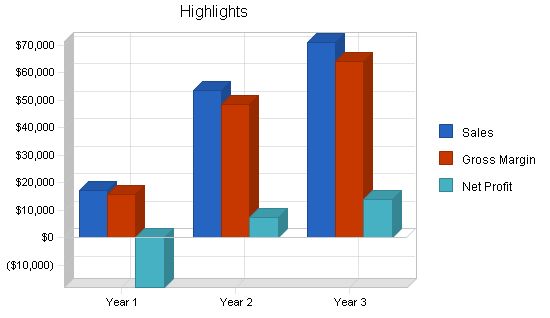
Contents
1.1 Mission
HandyMan Stan’s mission is to provide knowledgeable, convenient, and reasonably-priced handyman service to the Duluth, Minnesota community. HandyMan Stan will provide every customer with an honest day’s work and will fix anything that is not done right.
1.2 Keys to Success
- Treat every customer as the most important customer.
- Evaluate the needed skills for a job and pass it onto a contractor if it is too difficult.
- Work hard, guarantee all work, and promote 100% customer satisfaction.
1.3 Objectives
- Develop the business into full-time employment within 12 months.
- Generate steady revenue per year by the end of year two.
- Create over 20% of business from repeat customers.
Company Summary
HandyMan Stan has been formed as a Minnesota Limited Liability Company (LLC) by Stan Roberts. Stan will be the sole employee and owner of the company. The company will incur start-up costs, primarily tools, detailed in the Start-up Summary section.
2.1 Start-up Summary
HandyMan Stan will incur start-up costs associated with the beginning of the business. The following table details the start-up costs and indicates the needed capital for initial operations. Stan will be using his personal tools for jobs but will need to purchase additional equipment/tools including:
- Assorted plumbing tools: slip wrenches, snakes, teflon tape, and assorted caps, nuts, and bolts.
- Electrical tools: electrical gauge meters, wire cutters, various wires and wire caps, and a soldering iron.
- Painting materials: paint brushes, paint roller, pneumatic paint sprayer, air compressor, sandpaper, spackle tools, and masking tape.
- Pressure washer.
- Various general tools.
- Assorted power tools: drill, saw, sander, Dremel.
- Assorted nails, bolts, screws, and fixtures.
- Laptop with portable printer for mobile invoice printing and submission.
- Mobile phone.
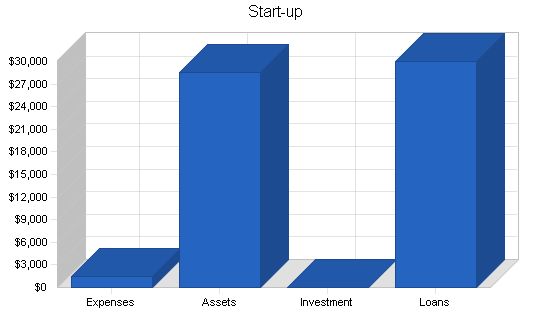
Start-up Requirements:
– Legal: $500
– Accountant: $500
– Brochures: $250
– Insurance: $250
– Total Start-up Expenses: $1,500
Start-up Assets:
– Cash Required: $20,500
– Other Current Assets: $0
– Long-term Assets: $8,000
– Total Assets: $28,500
Total Requirements: $30,000
Start-up Funding:
– Start-up Expenses to Fund: $1,500
– Start-up Assets to Fund: $28,500
– Total Funding Required: $30,000
Assets:
– Non-cash Assets from Start-up: $8,000
– Cash Requirements from Start-up: $20,500
– Additional Cash Raised: $0
– Cash Balance on Starting Date: $20,500
– Total Assets: $28,500
Liabilities and Capital:
– Liabilities:
– Current Borrowing: $0
– Long-term Liabilities: $30,000
– Accounts Payable (Outstanding Bills): $0
– Other Current Liabilities (interest-free): $0
– Total Liabilities: $30,000
– Capital:
– Planned Investment:
– Investor 1: $0
– Other: $0
– Additional Investment Requirement: $0
– Total Planned Investment: $0
– Loss at Start-up (Start-up Expenses): ($1,500)
– Total Capital: ($1,500)
Total Capital and Liabilities: $28,500
Total Funding: $30,000
Company Ownership:
Stan Roberts is the founder and owner of HandyMan Stan. The company will remain a one-man operation for the foreseeable future.
Services:
HandyMan Stan offers home repair and maintenance for homeowners and property managers in the community of Duluth. All services start at $30 per hour plus parts. HandyMan Stan provides at least one hour of work at the customer’s property. For larger jobs requiring a contractor, HandyMan Stan will pre-screen a service provider. Repairing items is prioritized over replacement, and HandyMan Stan offers a one-year guarantee for all work.
Market Analysis Summary:
HandyMan Stan’s target customer segments are homeowners and property managers. These customers often have small repairs that are too small for a contractor but too complicated to do themselves. The handyman industry competes with the contractor industry, with handymen typically handling small items and contractors taking on more extensive projects. Word of mouth referrals are crucial, and HandyMan Stan aims to provide exemplary service to generate new and repeat business.
Market Segmentation:
The market is segmented into two customer groups:
– Homeowners:
– The value of their homes generally ranges between $150,000 and $650,000.
– 47% attempt small repairs themselves but often realize they lack the necessary skills. The remaining 53% call a professional right away.
– 62% have owned their homes for more than two years.
– 73% wait until several small problems accumulate before calling a handyman, avoiding a large upfront charge for a single repair.
– Property Managers:
– Manage between three and 20 units.
– Typically don’t have their own in-house repairman to reduce overhead expenses.
– The range of monthly rental costs for their units is $350 to $675.
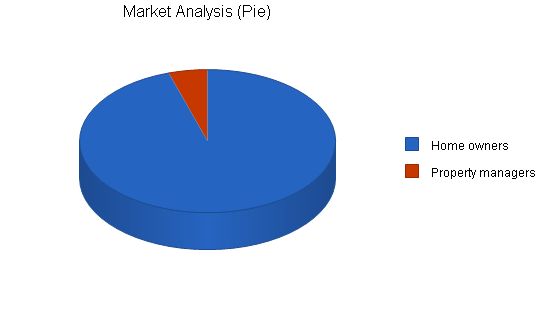
Market Analysis
Customer Segments:
Home owners
Property managers
Home owners prefer to hire someone for repairs instead of tackling them themselves.
Property managers with less than 20 units are more likely to hire someone for maintenance.
Location:
Majority of business will come from residents and rental properties within the Duluth city limits.
Service Business Analysis
Handymen are generalists who can handle a wide range of repairs.
Contractors are more specialized and suited for technical or extensive repairs.
Competition and Buying Patterns
Competitors:
– Jack Of All Trades: employs six handymen, lacks personal customer experience
– Fix-It-Up: specializes in plumbing and electrical problems, mixed customer reviews
– Duluth Contractors: full-service general contractor, does commercial and residential work
– Red Rock Contractors: small contractor, focuses on residential jobs
Consumers base their buying patterns on recommendations from friends or neighbors.
Word of mouth referrals will be important for HandyMan Stan.
Strategy and Implementation Summary
HandyMan Stan’s strategy is to offer reasonable prices and a one hour minimum for greater customer convenience.
Advertisement placement in organizational newsletters to develop awareness and trust among a community.
Sales Strategy
Convert current customers to use HandyMan Stan for a wide variety of repairs by showcasing professionalism and offering solutions to problem areas.
Conservative sales forecast based on activities performed by HandyMan Stan.
Needed parts billed additionally, consumables included in hourly fee.
Note:
This revised text eliminates redundant phrases and streamlines the information while maintaining clarity and impact.
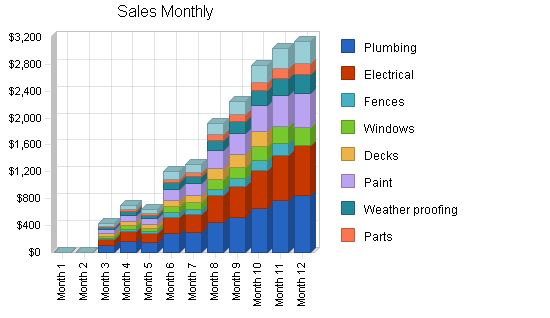
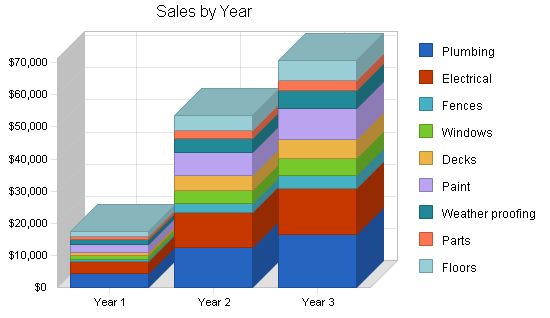
| Sales Forecast | |||
| Year 1 | Year 2 | Year 3 | |
| Sales | |||
| Plumbing | $4,250 | $12,500 | $16,550 |
| Electrical | $3,698 | $10,875 | $14,399 |
| Fences | $782 | $2,875 | $3,807 |
| Windows | $1,360 | $4,000 | $5,296 |
| Decks | $945 | $4,500 | $5,958 |
| Paint | $2,508 | $7,375 | $9,765 |
| Weather proofing | $1,403 | $4,125 | $5,462 |
| Parts | $850 | $2,500 | $3,310 |
| Floors | $1,615 | $4,750 | $6,289 |
| Total Sales | $17,410 | $53,500 | $70,834 |
| Direct Cost of Sales | Year 1 | Year 2 | Year 3 |
| Plumbing | $298 | $875 | $1,159 |
| Electrical | $185 | $544 | $720 |
| Fences | $23 | $86 | $114 |
| Windows | $109 | $320 | $424 |
| Decks | $38 | $180 | $238 |
| Paint | $226 | $664 | $879 |
| Weather proofing | $84 | $248 | $328 |
| Parts | $680 | $2,000 | $2,648 |
| Floors | $65 | $190 | $252 |
| Subtotal Direct Cost of Sales | $1,707 | $5,106 | $6,761 |
5.4 Milestones
HandyMan Stan has identified several specific milestones that will function as goals for the organization. The milestones will provide a target for achievement and a mechanism for tracking progress. The following table will provide a timeframe for each milestone.
| Milestones | |||||
| Milestone | Start Date | End Date | Budget | Manager | Department |
| Business plan completion | 1/1/2004 | 2/15/2004 | $0 | Stan | Marketing |
| First customer | 2/15/2004 | 3/15/2004 | $0 | Stan | Department |
| Full time work threshold | 3/15/2004 | 6/30/2005 | $0 | Stan | Department |
| Revenues exceeding $75,000 | 3/15/2004 | 7/15/2005 | $0 | Stan | Department |
| Totals | $0 | ||||
Web Plan Summary
HandyMan Stan’s website will serve as a basic catalog of offered services. In addition to a listing of Stan’s different skills, testimonials and referrals will be included on the site. This is effective at swaying unsure people who have never heard about HandyMan Stan. More inquiries will be directed to Stan’s phone number.
6.1 Website Marketing Strategy
The marketing strategy will employ two mechanisms:
- Search engine submission: This is useful for people unfamiliar with HandyMan Stan and for those looking for a local handyman.
- URL on all printed material: The site’s Web address will be listed on every printed piece of material.
6.2 Development Requirements
The site will be developed by a friend under a barter agreement. Because the value of the development services will be less than $600, it will not need to be listed as a payout of 1099 income for tax purposes.
Management Summary
Stan Roberts is the founder and sole employee of HandyMan Stan. Stan began as a “fixer” out of high school when he secured a job with a general contractor. Without formal contractor/construction experience, he assisted in a wide range of capacities.
Over ten years, Stan became proficient in a wide range of activities, becoming a journeyman plumber and electrician as well as developing a strong repertoire of general fixing skills.
Stan enrolled in business courses at the local community college at night, spending two years developing his business skills. Once he completed the course, he felt more comfortable with starting a new business.
7.1 Personnel Plan
HandyMan Stan is a one-man business. Stan will perform all of the handyman activities and be responsible for accounting issues using Quicken. With a laptop computer and portable printer, Stan will be able to create, print, submit, and collect invoices on site immediately following the completed project.
| Personnel Plan | |||
| Year 1 | Year 2 | Year 3 | |
| Stan | $20,000 | $24,000 | $30,000 |
| Other | $0 | $0 | $0 |
| Total People | 1 | 1 | 1 |
| Total Payroll | $20,000 | $24,000 | $30,000 |
Financial Plan
The following sections outline important financial information.
8.1 Important Assumptions
The following table details important financial assumptions.
| General Assumptions | |||
| Year 1 | Year 2 | Year 3 | |
| Plan Month | 1 | 2 | 3 |
| Current Interest Rate | 10.00% | 10.00% | 10.00% |
| Long-term Interest Rate | 10.00% | 10.00% | 10.00% |
| Tax Rate | 30.00% | 30.00% | 30.00% |
| Other | 0 | 0 | 0 |
8.2 Projected Profit and Loss
The following table and charts indicate the projected profit and loss.
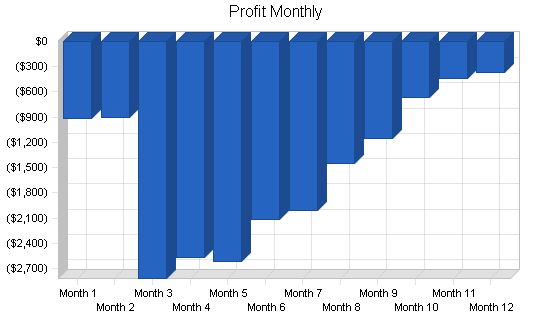
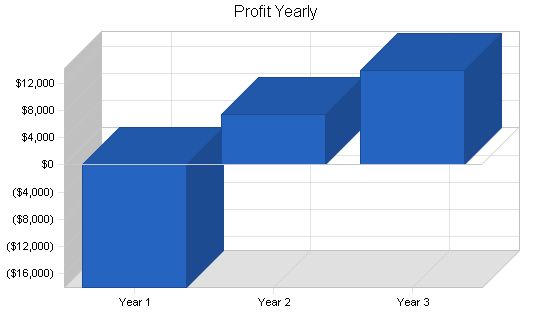
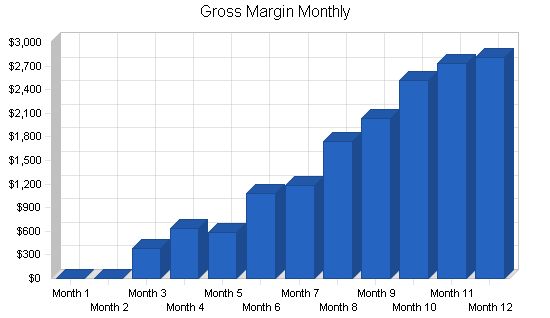
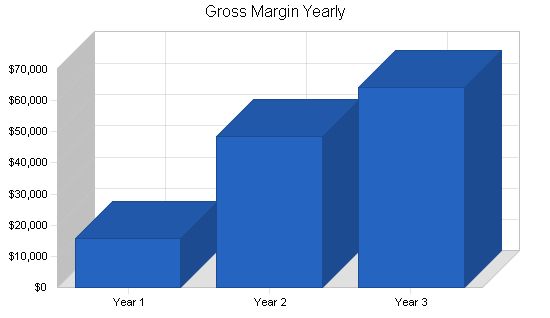
Pro Forma Profit and Loss
| Pro Forma Profit and Loss | |||
| Year 1 | Year 2 | Year 3 | |
| $17,410 | $53,500 | $70,834 | |
| $1,707 | $5,106 | $6,761 | |
| $0 | $0 | $0 | |
| $1,707 | $5,106 | $6,761 | |
| $15,703 | $48,394 | $64,073 | |
| 90.20% | 90.46% | 90.46% | |
| $20,000 | $24,000 | $30,000 | |
| $1,800 | $1,800 | $1,800 | |
| $1,596 | $1,596 | $1,596 | |
| $360 | $360 | $360 | |
| $2,400 | $2,400 | $2,400 | |
| $3,000 | $3,600 | $4,500 | |
| $1,800 | $1,800 | $1,800 | |
| $30,956 | $35,556 | $42,456 | |
| ($15,253) | $12,838 | $21,617 | |
| ($13,657) | $14,434 | $23,213 | |
| $2,740 | $2,279 | $1,808 | |
| $0 | $3,168 | $5,943 | |
| ($17,994) | $7,391 | $13,866 | |
| -103.36% | 13.82% | 19.58% | |
8.3 Break-even Analysis
The Break-even Analysis shows the required monthly revenue to reach the break-even point.
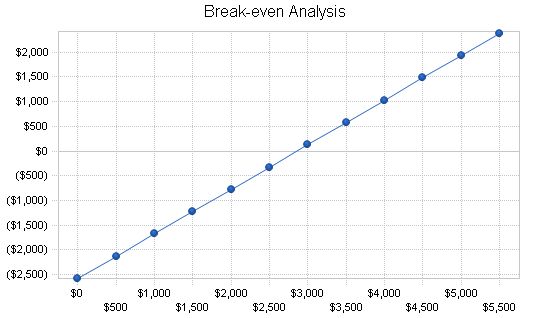
Break-even Analysis:
Monthly Revenue Break-even: $2,860
Assumptions:
– Average Percent Variable Cost: 10%
– Estimated Monthly Fixed Cost: $2,580
8.4 Projected Cash Flow:
The table and chart below show the projected cash flow.
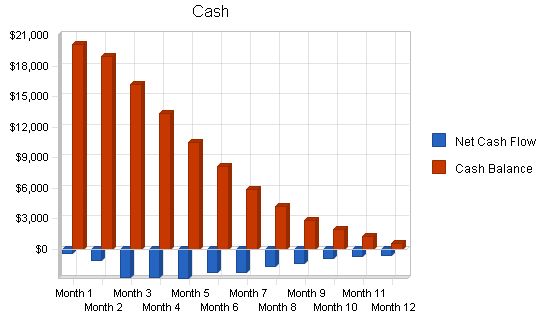
Pro Forma Cash Flow
| Year 1 | Year 2 | Year 3 | |
| Cash Received | |||
| Cash from Operations | |||
| Cash Sales | $17,410 | $53,500 | $70,834 |
| Subtotal Cash from Operations | $17,410 | $53,500 | $70,834 |
| Additional Cash Received | |||
| Sales Tax, VAT, HST/GST Received | $0 | $0 | $0 |
| New Current Borrowing | $0 | $0 | $0 |
| New Other Liabilities (interest-free) | $0 | $0 | $0 |
| New Long-term Liabilities | $0 | $0 | $0 |
| Sales of Other Current Assets | $0 | $0 | $0 |
| Sales of Long-term Assets | $0 | $0 | $0 |
| New Investment Received | $0 | $0 | $0 |
| Subtotal Cash Received | $17,410 | $53,500 | $70,834 |
| Expenditures | Year 1 | Year 2 | Year 3 |
| Expenditures from Operations | |||
| Cash Spending | $20,000 | $24,000 | $30,000 |
| Bill Payments | $12,484 | $20,150 | $24,972 |
| Subtotal Spent on Operations | $32,484 | $44,150 | $54,972 |
| Additional Cash Spent | |||
| Sales Tax, VAT, HST/GST Paid Out | $0 | $0 | $0 |
| Principal Repayment of Current Borrowing | $0 | $0 | $0 |
| Other Liabilities Principal Repayment | $0 | $0 | $0 |
| Long-term Liabilities Principal Repayment | $4,868 | $4,688 | $4,727 |
| Purchase Other Current Assets | $0 | $0 | $0 |
| Purchase Long-term Assets | $0 | $0 | $0 |
| Dividends | $0 | $0 | $0 |
| Subtotal Cash Spent | $37,352 | $48,838 | $59,699 |
| Net Cash Flow | ($19,943) | $4,662 | $11,135 |
| Cash Balance | $557 | $5,220 | $16,354 |
8.5 Projected Balance Sheet
The table below presents the projected balance sheet for the given period.
| Year 1 | Year 2 | Year 3 | |
| Assets | |||
| Current Assets | |||
| Cash | $557 | $5,220 | $16,354 |
| Other Current Assets | $0 | $0 | $0 |
| Total Current Assets | $557 | $5,220 | $16,354 |
| Long-term Assets | |||
| Long-term Assets | $8,000 | $8,000 | $8,000 |
| Accumulated Depreciation | $1,596 | $3,192 | $4,788 |
| Total Long-term Assets | $6,404 | $4,808 | $3,212 |
| Total Assets | $6,961 | $10,028 | $19,566 |
| Liabilities and Capital | Year 1 | Year 2 | Year 3 |
| Current Liabilities | |||
| Accounts Payable | $1,323 | $1,686 | $2,085 |
| Current Borrowing | $0 | $0 | $0 |
| Other Current Liabilities | $0 | $0 | $0 |
| Subtotal Current Liabilities | $1,323 | $1,686 | $2,085 |
| Long-term Liabilities | $25,132 | $20,444 | $15,717 |
| Total Liabilities | $26,455 | $22,130 | $17,802 |
| Paid-in Capital | $0 | $0 | $0 |
| Retained Earnings | ($1,500) | ($19,494) | ($12,102) |
| Earnings | ($17,994) | $7,391 | $13,866 |
| Total Capital | ($19,494) | ($12,102) | $1,764 |
| Total Liabilities and Capital | $6,961 | $10,028 | $19,566 |
| Net Worth | ($19,494) | ($12,102) | $1,764 |
8.6 Business Ratios
The following table presents business ratios specific to HandyMan Stan as well as industry ratios for the Personal and Household Goods Repair and Maintenance industry (NAICS code 811490).
| Year 1 | Year 2 | Year 3 | Industry Profile | |
| Sales Growth | 0.00% | 207.30% | 32.40% | 9.27% |
| Percent of Total Assets | ||||
| Other Current Assets | 0.00% | 0.00% | 0.00% | 27.35% |
| Total Current Assets | 8.00% | 52.05% | 83.58% | 66.95% |
| Long-term Assets | 92.00% | 47.95% | 16.42% | 33.05% |
| Total Assets | 100.00% | 100.00% | 100.00% | 100.00% |
| Current Liabilities | ||||
| Accounts Payable Turnover | 10.44 | 12.17 | 12.17 | n.a |
| Payment Days | 27 | 27 | 27 | n.a |
| Total Asset Turnover | 2.50 | 5.34 | 3.62 | n.a |
| Debt to Net Worth | 0.00 | 0.00 | 10.09 | n.a |
| Current Liab. to Liab. | 0.05 | 0.08 | 0.12 | n.a |
| Net Working Capital | ($766) | $3,534 | $14,269 | n.a |
| Interest Coverage | -5.57 | 5.63 | 11.96 | n.a |
| Assets to Sales | 0.40 | 0.19 | 0.28 | n.a |
| Current Debt/Total Assets | 19% | 17% | 11% | n.a |
| Acid Test | 0.42 | 3.10 | 7.84 | n.a |
| Sales/Net Worth |
| Personnel Plan | |||||||||||||
| Month 1 | Month 2 | Month 3 | Month 4 | Month 5 | Month 6 | Month 7 | Month 8 | Month 9 | Month 10 | Month 11 | Month 12 | ||
| Stan | 0% | $0 | $0 | $2,000 | $2,000 | $2,000 | $2,000 | $2,000 | $2,000 | $2,000 | $2,000 | $2,000 | $2,000 |
| Other | 0% | $0 | $0 | $0 | $0 | $0 | $0 | $0 | $0 | $0 | $0 | $0 | $0 |
| Total People | 1 | 1 | 1 | 1 | 1 | 1 | 1 | 1 | 1 | 1 | 1 | 1 | |
| Total Payroll | $0 | $0 | $2,000 | $2,000 | $2,000 | $2,000 | $2,000 | $2,000 | $2,000 | $2,000 | $2,000 | $2,000 | |
| General Assumptions | |||||||||||||
| Month 1 | Month 2 | Month 3 | Month 4 | Month 5 | Month 6 | Month 7 | Month 8 | Month 9 | Month 10 | Month 11 | Month 12 | ||
| Plan Month | 1 | 2 | 3 | 4 | 5 | 6 | 7 | 8 | 9 | 10 | 11 | 12 | |
| Current Interest Rate | 10.00% | 10.00% | 10.00% | 10.00% | 10.00% | 10.00% | 10.00% | 10.00% | 10.00% | 10.00% | 10.00% | 10.00% | |
| Long-term Interest Rate | 10.00% | 10.00% | 10.00% | 10.00% | 10.00% | 10.00% | 10.00% | 10.00% | 10.00% | 10.00% | 10.00% | 10.00% | |
| Tax Rate | 30.00% | 30.00% | 30.00% | 30.00% | 30.00% | 30.00% | 30.00% | 30.00% | 30.00% | 30.00% | 30.00% | 30.00% | |
| Other | 0 | 0 | 0 | 0 | 0 | 0 | 0 | 0 | 0 | 0 | 0 | 0 | |
| Pro Forma Profit and Loss | |||||||||||||
| Month 1 | Month 2 | Month 3 | Month 4 | Month 5 | Month 6 | Month 7 | Month 8 | Month 9 | Month 10 | Month 11 | Month 12 | ||
| Sales | $0 | $0 | $428 | $706 | $642 | $1,198 | $1,305 | $1,926 | $2,247 | $2,782 | $3,038 | $3,137 | |
| Direct Cost of Sales | $0 | $0 | $41 | $67 | $61 | $114 | $125 | $184 | $214 | $266 | $305 | $329 | |
| Other Costs of Sales | $0 | $0 | $0 | $0 | $0 | $0 | $0 | $0 | $0 | $0 | $0 | $0 | |
| Total Cost of Sales | $0 | $0 | $41 | $67 | $61 | $114 | $125 | $184 | $214 | $266 | $305 | $329 | |
| Gross Margin | $0 | $0 | $387 | $639 | $581 | $1,084 | $1,181 | $1,742 | $2,033 | $2,516 | $2,733 | $2,807 | |
| Gross Margin % | 0.00% | 0.00% | 90.46% | 90.46% | 90.46% | 90.46% | 90.46% | 90.46% | 90.46% | 90.46% | 89.95% | 89.51% | |
Hello!
I’m Andrew Brooks, a seasoned finance consultant from the USA and the mind behind phonenumber247.com.
My career is built on a foundation of helping individuals and businesses thrive financially in an ever-changing economic landscape. At phonenumber247.com, my aim is to demystify the complex world of finance, providing clear, actionable advice that can help you navigate your financial journey with confidence. Whether it’s personal finance management, investment strategies, or understanding the nuances of market dynamics, I’m here to share insights and tools that can propel you towards your financial goals.
Welcome to my digital space, where every piece of advice is a step closer to financial clarity and success!

